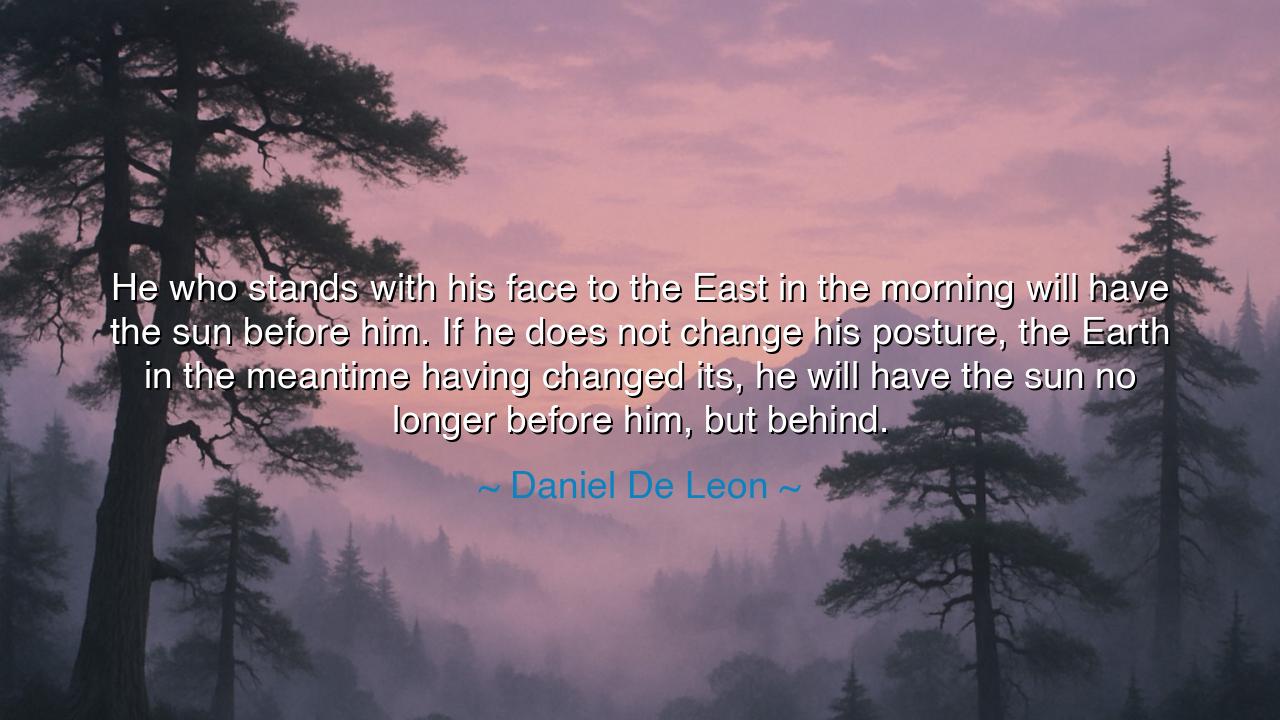
He who stands with his face to the East in the morning will have
He who stands with his face to the East in the morning will have the sun before him. If he does not change his posture, the Earth in the meantime having changed its, he will have the sun no longer before him, but behind.






"He who stands with his face to the East in the morning will have the sun before him. If he does not change his posture, the Earth in the meantime having changed its, he will have the sun no longer before him, but behind." These words from Daniel De Leon carry a powerful metaphor about adaptability and the necessity of change. In the simplest form, De Leon speaks of the sun's journey across the sky and how it is a reflection of our own journeys—our need to constantly adjust, learn, and grow in order to remain aligned with the forces that drive us forward. To face the East in the morning is to seek the promise of the new day, but if we remain fixed, refusing to adapt to the changes around us, we risk finding ourselves in the shadow, disconnected from the very energy that once guided us.
In the ancient world, the movement of the sun across the sky was not just a natural phenomenon; it was a symbol of life's cycles, a reminder that all things are in constant motion. The Egyptians, for example, viewed the sun as the most powerful of gods, Ra, whose journey across the sky was mirrored by the cycles of life, death, and rebirth. Each day, Ra would rise in the East, symbolizing renewal, and set in the West, symbolizing completion. This constant movement was understood to represent the flow of time and the necessity of accepting the inevitable changes that each new day brings. De Leon’s words echo this ancient wisdom, reminding us that if we refuse to adapt, we risk being left behind, out of sync with the world around us.
Consider the great philosopher and warrior Alexander the Great, whose life was defined by his unrelenting quest for expansion and conquest. He understood that the world did not remain still—empires rose, battles were won and lost, and time itself moved forward. It was through his ability to adapt, to change tactics and innovate in response to shifting circumstances, that he was able to build one of the greatest empires in history. Alexander’s story is a testament to the power of flexibility—to constantly shift our position and perspective in order to remain aligned with the changing forces of the world. Like De Leon’s metaphor of the sun, Alexander knew that standing still in the face of change would mean falling behind, leaving him in the shadow of those who were willing to adapt.
Similarly, in the Roman Empire, Julius Caesar faced the realities of a changing world. His rise to power was not solely based on his military prowess, but on his ability to read the changing political landscape and adapt his strategies accordingly. When he crossed the Rubicon, he did so knowing that the world around him had shifted, and the old structures of power were no longer enough to achieve his goals. He understood that standing still—holding on to the past—was not an option. Instead, he embraced the new and innovative strategies that would secure his place in history. His ability to adapt to the changing tides of Roman politics was key to his ultimate success, much as De Leon suggests we must do to remain aligned with the forces that shape our lives.
De Leon’s quote is not just about the physical act of change, but about the mental and spiritual flexibility we must cultivate in our lives. The world around us is in constant flux, and if we refuse to adjust, to learn, to adapt, we risk becoming stagnant, stuck in outdated beliefs, and disconnected from the flow of life. This can be seen in societies that have failed to adapt to new technologies, ideas, and cultural shifts. Those who cling too tightly to the old ways—whether in politics, religion, or personal growth—often find themselves outpaced by those willing to embrace change. It is not enough to simply face the East and expect the sun to remain before us; we must be willing to adjust our posture as the world around us evolves.
The lesson that De Leon imparts is clear: we must be willing to adapt to the changing circumstances of life. Just as the Earth’s rotation moves the sun across the sky, the forces of time, experience, and society will inevitably alter the landscape we navigate. Standing still, refusing to shift our position, will leave us in the shadows, disconnected from the energy and opportunities that the world has to offer. Instead, we must remain mindful and flexible, adjusting our approach as circumstances demand. This is the way of the ancients—the way of the warrior, the philosopher, and the statesman, who knew that their success lay not in rigid adherence to old ways, but in their ability to evolve with the world around them.
In practical terms, this means we must be vigilant about our own growth and adaptability. In work, relationships, and personal development, we must be ready to shift our mindset, to let go of outdated beliefs, and to seek out new avenues for learning and improvement. Just as Alexander and Caesar adapted to the shifting tides of their times, so too must we be willing to change, to let go of the comfortable positions we’ve held, and to embrace the unknown with confidence. In doing so, we can ensure that the sun remains before us, guiding us to new horizons of success, fulfillment, and wisdom. The key is not to resist change, but to embrace it, using it as a tool to move forward into the light.






AAdministratorAdministrator
Welcome, honored guests. Please leave a comment, we will respond soon